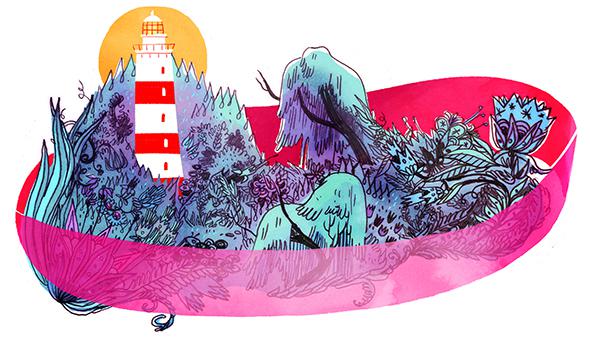What is Jeff VanderMeer’s Southern Reach Trilogy? VanderMeer is a three-time winner of the World Fantasy Award, but these books aren’t exactly fantasy. They paint a bitter picture of a future harsh to humanity, but offer little in the way of Hunger Games-esque dystopian thrills and nothing at all in the way of a Katniss Everdeen-esque hero. The books have a mystery at their center, but it’s an apocalyptic mystery starring detectives who either don’t have the wherewithal to solve it, aren’t any good at solving it, or don’t care about solving it. Or all three. Because the concept of a “sleuth,” the one who pieces together the available data into a complete picture, is one form of human identity. And in the Southern Reach Trilogy’s naturalist Armageddon, your identity is the bad guy.
This year, FSG has published all three volumes of the trilogy in handsome, trippy little paperback editions, the better for binge-reading. With the conclusion, Acceptance, out this month, it’s worth looking at all three extraordinary books to see what makes VanderMeer’s trilogy such a frustrating triumph. And I mean that as a straight-up descriptor, not as a contradiction—Southern Reach is a triumph in many ways because it is frustrating.
There’s really no way to give the Southern Reach pitch without sounding high, so I won’t try. Basically, OK, there’s this area of the United States—possibly Florida, but it’s unclear—called “the forgotten coast,” and about 30 years ago it was mysteriously taken over by an environment called “Area X,” described by many who visit it as “a pristine wilderness.” Area X retains a few vestiges of the human society that existed there before this transformative event—some bits and bobs of houses, and more importantly, a pretty pivotal lighthouse—but mostly it’s a teeming, pollution-free natural habitat. “In the forest near base camp one might encounter black bears or coyotes,” VanderMeer writes. “You might hear a sudden croak and watch a night heron startle from a tree branch and, distracted, step on a poisonous snake, of which there were at least six varieties.” The unknown force that created Area X also surrounded it with a border that seems to disintegrate any object or creature that touches it.
The border does have one opening that allows humans to enter and (less frequently) leave. It is at this portal that a mysterious government institution called “Central” has established Southern Reach, the base from which a variety of scientists and other operatives attempt to study Area X. These attempts are feeble at best and disastrous at worst: Of the numerous expeditions dispatched into Area X, most have ended in the violent deaths or disappearances of all involved. Most of those who make it back return sporting a blank affect, their crucial journals left behind. Those returnees describe their Area X experiences with bland generalities before quickly dying of cancer.
At the outset of Annihilation, the first book of the trilogy, a woman who lost her husband in the aftermath of the previous expedition (officially called the “eleventh” one, but the numbering quickly turns out to be fudged by the higher-ups) successfully gets past intense screening from Central to join the “twelfth” one. What’s this woman’s name? We don’t know—the Southern Reach wants the members of the all-female expedition to know each other only by their functions: the psychologist, the surveyor, the anthropologist, and our hero the biologist. The idea is that the less they know about each other, they less likely they are to turn on each other under the influence of Area X. So it is through this deliberately alienating veil of anonymity that we follow their increasingly transformative odyssey to Area X’s foremost mystery: a cylindrical structure, mostly buried underground, with a spiral staircase leading down to a whole host of terrifying encounters.
But VanderMeer’s got an agenda with the lack of names as well, as quickly becomes clear at the outset of Book 2, Authority. Authority follows the frustrated attempts (and by the way, a great Snicket-y alternate title for this trilogy would be A Series of Frustrated Attempts) of a new interim director to get the Southern Reach in order, following the disappearance of its previous director on the twelfth expedition. So what was the previous director’s name? For a long time we don’t get one. She was “the psychologist” who accompanied “the biologist” on the previous expedition, and eventually we learn that her name is Cynthia … except it’s also not.
OK then, what about the interim director, what about our new hero, what’s his name? Well, we get it eventually, but mostly he’s referred to as “Control.” Now on one level this is a too on-the-nose irony for a character who quickly proves to have no control over anything, but it’s much more interesting as an homage—and a response—to an identically named character in John le Carré’s Tinker, Tailor, Soldier, Spy.
In le Carré’s novel, Control is the former head of British Intelligence who first uncovers corruption in his organization. His successor, George Smiley, has to draw on materials left behind by Control to root it out. Authority’s Control takes on Smiley’s role as successor-sleuth, but unlike Smiley, he’s dealing with a mystery that may have no solution. Going through his predecessor’s notes, he despairs: “How Control hated his own imagination, wished it would just shrivel up and turn brown and fall out of him. He was more willing to believe that something was staring out at him from the notes, something hidden looking at him, than to accept that the director had been pursuing dead ends. And yet he couldn’t see it. He could only see her searching, and wonder why she was searching so hard.” Human affairs, even labyrinthine espionage-based ones, may be ultimately comprehensible, VanderMeer suggests. But what’s happening in Area X is far beyond human—utterly outside the reference points humans use to perceive the world.
The closing chapter in the trilogy, Acceptance, brings Control and the biologist together for a final expedition into the rapidly expanding Area X. Except the biologist isn’t exactly the biologist anymore. Now she’s called Ghost Bird, and despite looking like the biologist and possessing the biologist’s memories, she insists that she’s not the biologist, and indeed that the biologist may be waiting for them as they trudge through Area X.

Illustration by Eric Nyquist
Character names are, of course, a simple comfort an author extends a reader. By withholding and shifting those names, VanderMeer strips that away from us. As the pristine wilderness of Area X transforms humans into bizarre, nearly unperceivable creatures, as it threatens to leap beyond its bounds and swallow the outside world, a second, simultaneous apocalypse is also happening: the end of human identity. As much as Area X seems to be a forcible corrective to human-driven ecological destruction, it also challenges what VanderMeer presents as the root of human unhappiness: the stories we tell ourselves about who we are.
If Hugh Howey’s apocalyptic Wool series imagines the human race forced to live in silos, VanderMeer’s Southern Reach suggests that’s unnecessary. We’re already silos unto ourselves. Every major character in the trilogy is desperately lonely, unable to maintain relationships, bereft of anything resembling a confidant, dependent on alcohol or casual sex to maintain any equilibrium. They’re all paranoid: Again and again, every statement a secondary character makes to the biologist or Control or Cynthia-whose-name-isn’t-Cynthia is deconstructed for a secret agenda. VanderMeer never treats spoken language as direct communication, but rather as obfuscation, holding action, or manipulation. Our identities, VanderMeer suggests, are rotting lighthouses we live inside and peer out of, suspiciously. They create the false sense that we can control the world around us—that we can even see it clearly.
Which ultimately makes the biologist/Ghost Bird the only hero equal to this story, VanderMeer’s one example of a way forward for humanity in the natural avalanche of Area X. She’s not ambitious; she doesn’t stake out territory in the way the other characters do. She’s happiest in nature, simply recording it, observing it, to no specific long-term purpose. While sojourning on an island in Area X, she writes in her journal, “I have felt more acutely than ever that here on this island I should never be taken out of the moment. To be taken out of the moment is dangerous—that is when things sneak their way in and then there is no present moment to return to.” And she’s fine with leaving mysteries unsolved. Observing the defiant Control, who still hopes to effectively oppose Area X, Ghost Bird observes, “He could not jettison some essential sentimentality that was of no use here, some mechanism that belonged to the world outside.” Whatever that sentimentality is—is it humanity?—Ghost Bird’s fresh out.
I’ve treaded carefully here, tiptoeing around spoilers, because I want you to read the Southern Reach Trilogy. But if that’s the case, why did I call it frustrating? That’s not generally considered a good marketing word. And certainly any story involving a mysterious wilderness with a mysterious monster in it enters our culture under the long shadow of the TV series Lost, which earned tremendous enmity from fans who felt it failed to explain a number of its mysteries.
So if you binge-read Southern Reach the way you may have binge-watched Lost on Netflix, will you be enraged at the end? Well, without giving away which mysteries are solved and which aren’t—and I should stress, there are some fantastic payoffs along the way, a few of which made me gasp—I’m going to predict that you won’t be. For one thing, the books, for all their Baudrillardian knottiness, are big fun to read. (I had to repeatedly steal them back from my wife just so I could write this review.) But more pertinently, this frustration that manifests over and over throughout the trilogy—as the characters repeatedly fail not only to solve the mystery of Area X, but indeed to even meaningfully perceive it—doesn’t feel like a cheat, but rather a natural outgrowth of how these books see humanity. We’re isolated. We’re easily manipulated. We don’t cooperate. We’re poorly suited to our natural habitat, and insignificant in the face of its untamed grandeur. We care more about our image of ourselves, our identity, than about our interaction with the world around us. The colossal physical and spiritual transformation Area X represents is beyond human reference. We can either participate or get rolled over.
And that’s the buy-in you either make or don’t make when you’re reading the Southern Reach Trilogy, the most uncompromising—yet most rewarding—genre series I’ve read in quite some time. Are you the biologist, prepared to accept frustration as a byproduct of any worthwhile expedition into the unknown? Or are you Control, bristling against uncertainty to the end?
—
The Southern Reach Trilogy, by Jeff VanderMeer: Annihilation, Authority, and Acceptance. Farrar, Straus and Giroux.
See all the pieces in this month’s Slate Book Review.
Sign up for the Slate Book Review monthly newsletter.
